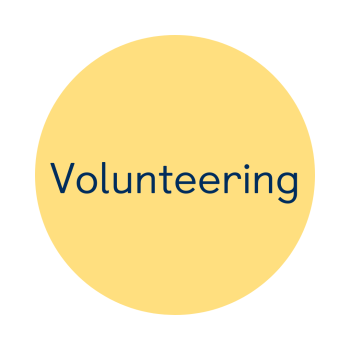We hear from volunteers, Ian Carnachan and Brenda Liston, on their return to volunteering in their communities after the pandemic.
For anyone unfamiliar with your volunteer role, please can you explain what you do?
Ian: My role as Fundraising Group Coordinator for my local Peninsula branch sees me keeping in touch with all members of our group, organising our monthly meetings and visits to local shopping centres to trade, and providing information on Guide Dogs to the local community. I’m always on the lookout for new ways to fundraise.
Brenda: I’m a My Sighted Guide volunteer with a chap who has had very limited vision since birth. I collect him from his home and take him out for a trip. He’s very interested in being outdoors. We often walk to the High Street and have also been further afield. If we’re feeling energetic, we'll walk to the High Street which is about 20 minutes away and treat ourselves to a cheeky coffee and a sausage roll (or slice of cake!), or we go to the park where he enjoys racing his remote-control cars. We sometimes go to Vision, which is a local charity, for a chat regarding the technology available to him and he has found this very useful. We have also taken a trip to Wimbledon Common where he was very eager to visit as this was somewhere he remembers from trips when he was younger. We always have an adventure and have met very kind people on our travels.
How did lockdowns and social distancing impact your volunteering?
Ian: It had a major impact because we couldn’t meet in person, so we more or less hibernated for two years. I felt very sad that I couldn’t carry out my role and missed interacting with other volunteers and supporters. Even though we weren’t operational we really appreciated the support we received from Guide Dogs who kept in touch on a regular basis in various ways. This meant we were all ready to start back once it was safe to do so.
Brenda: When we couldn’t go out, I phoned my My Sighted Guide partner every two weeks instead. I was also supporting another chap with ‘keeping in touch’ calls. I’m still in contact with him and we’re great friends. We chat for about an hour every two weeks. Both of my My Sighted Guide partners are very interesting and have had very different lives but are both fascinating to speak with and my life has definitely been enriched by getting to know both of them.
Now the most disruptive years of the pandemic are behind us, what’s it like to be volunteering in-person/in communities again?
Ian: It's great. Our group is nearly as busy as we were before lockdown and it’s wonderful to be out and meeting everyone again. We have even had some new volunteers which is a good help. And of course it's great to see money coming in again!
Brenda: It’s great to get out and about with my My Sighted Guide partner. We’re in a weekly routine, we’re both getting fitter and our wellbeing is improving. Also, the technology meetings at Vision are of great interest to my My Sighted Guide partner (I have also learnt lots from them too) but the main benefit is mixing with others who have a vision impairment, getting an understanding of their challenges and making friends.
Your role is visible among the public and communities. Why do you think this is important?
Ian: It’s important because people shouldn’t distract working guide dogs when they see them out and about. But when they see me and other volunteers at events, they can come and talk to us and find out more about Guide Dogs. I ensure all our volunteers are up to date with all latest information so they can answer any questions. Our local group is the public face of Guide Dogs locally – If we were not out and about we wouldn’t get all the support that we do.
Brenda: Sometimes I think that people with disabilities can be forgotten about and I feel it is important for people with sight loss to be visible in our communities, and be integrated. It is amazing how many people speak with us when we’re out (which doesn’t usually happen in London) and hopefully they develop an understanding of what's it's like to live with sight loss. I always discuss my volunteering role and try to encourage others to become volunteers (my husband volunteers now also). It doesn’t take much time, it’s only once a week and we both really enjoy our outings. It’s a time for me to switch off from all my distractions and focus on what matters most, which is making the time out for our My Sighted Guide partnerships.
What can someone expect from volunteering in your role?

Ian: Having the satisfaction of leading a great team of volunteers and the chance to get behind a cause that is very dear to everyone who is part of the Guide Dogs family. A Fundraising Group Coordinator is only as good as their team and you can expect to play a leading role. You'll need to be willing to go the extra mile, able to think of new fundraising ideas and always be on the lookout for new opportunities.
Brenda: It doesn’t take up much time, it’s once a week with my My Sighted Guide partner, and once every two weeks with the chap I speak to on the phone. It’s definitely had a positive impact on me as a person. It does make me realise how lucky I am, even though both of my My Sighted Guide partners are the most positive people I have met throughout my life and we always laugh during our interactions (whether via phone or out and about). I really enjoy their company and wouldn’t be without them both now.
